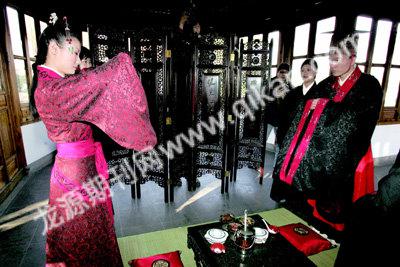Our Hangzhou, Our Happiness
2009-06-05WangLi
Wang Li

Hangzhou, the capital city of Zhejiang, a coastal province in eastern China, first won the title of “the happiest city of China” in 2004. The title was the result of a national survey hosted by Oriental Outlook, a Shanghai-based news medium under Xinhua News Agency.In 2008, the city received the annual honor for the fifth consecutive time in Kunming, the capital of Yunnan Province in southwestern China.
For Hangzhou, happiness is more than a physical sense and a sensation. It can also be defined in objective indicators. Over the past five years, the city has witnessed its GDP data soar from 156.8 billion yuan to 344.1 billion, and the per capita GDP value from $3,029 to $6,505, the financial revenue from 18.8 billion yuan to 61.4 billion. The data convincingly defines Hangzhou as a moderately developed city.
The happiest city is not the only honor Hangzhou has been endowed with over the past five years. Other prestigious honors before and since 2003 have also helped the city strive for excellence in various aspects. In 2003, Hangzhou won UN Human Habitat Award. In 2002, it won the honor of International Garden City. In 2003, it was rated as the Most Secure City by the Ministry of Public Security. The World Bank has credited Hangzhou as the No. 1 of the Cities with Best Investment Environment in China for three consecutive years. Forbes has listed Hangzhou as No. 1 among the Top 10 Best Commercial Cities in Mainland China for three consecutive years, just to mention a few of the honors the city has won over the past few years.
The sense of happiness comes from the experiences of residents, and from the experiences of those who have come and chosen to live in the city as their new hometown. Rapid and great changes in Hangzhou over the past years have contributed to their sense of happiness in Hangzhou. The citys decision makers define Hangzhou as “a city of quality life”. Over years, a string of effective projects has radically transformed the city and its suburbs.
The sense of happiness comes from the experiences of those who seek their individual futures in the city. A variety of policies has turned Hangzhou into a paradise of investment and business small and large.

Old Peng came to Hangzhou in 2002 with his family. Peng and his wife started a breakfast business. They got up at 2oclock every morning and prepared all the ingredients and started to sell breakfast at 5. After three years, the couple founded a food processing plant. Today, the business sits in a workshop of 100 m2 and employs 10 workers and makes a profit of about 80,000 yuan a year. Old Peng and his family live in a village of 500 where 70% are engaged in small businesses.
The 23-year-old college graduate Jin Jin started his cartoon/animation business two years ago. Within a short period of time, it has grown into the provinces biggest online game website with a workforce of 300. The company was worth one billion yuan last year in an evaluation by an internationally renowned venture capital.

A sense of happiness is jointly created and shared by the 6.6 million people in Hangzhou and the happiest city in the country resulted partly from a public survey held in Hanghzou. The list of happiest cities in China has 12 indicators. In addition to the economic data, other indicators examine the citys social, cultural and residential environment in an all-round way. And the survey required input from residents of the city. Hangzhou Daily started a special column for the survey, the definitive test of the public sentiment toward the subject. The general public responded most favorably. Topics presented in the column became household words and feedback flocked in. The public votes in Hangzhou helped the city win the top prestige again in 2008. □
